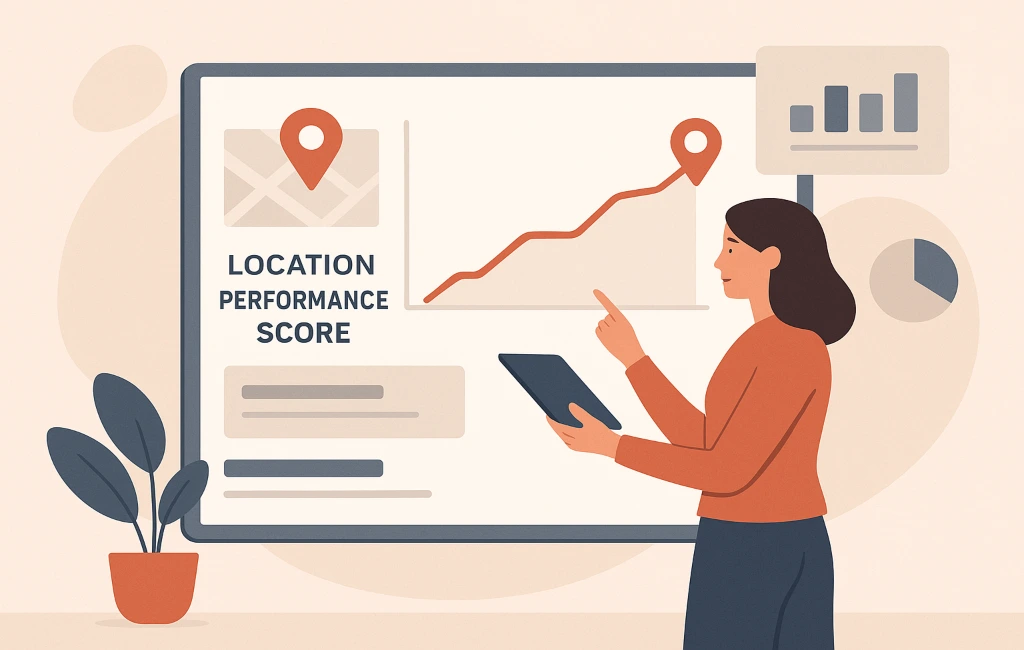Location Performance Score: The Smart Metric for Measuring Business Impact
As a marketer managing multiple business locations, you depend on various local marketing metrics to measure success. You might optimize your Google Business Profiles, manage customer reviews, and invest in localized ads — but often, the insights are scattered and don't add up to a full picture of your impact.
While marketers typically track individual performance indicators like:
- Local search rankings – Where do your locations appear in local results, and how frequently?
- Local conversion rate – Are online actions like clicks, calls, and direction requests turning into real-world visits or sales?
- Cost per local lead – How much are you spending to acquire leads through local marketing?
- Return on ad spend (ROAS) – Is your local advertising delivering profitable returns?
- Local customer lifetime value (LCLV) – What long-term value do customers bring after engaging with your local presence?
These metrics, though valuable, don't always align. You could rank at the top of local search and still struggle with low foot traffic or poor reviews. The lack of a unified view makes it hard to prioritize actions or prove marketing ROI.
The Challenge: Fragmented Local Marketing Metrics
The Challenge: Fragmented Local Marketing Metrics
Multi-location marketers often work with fragmented tools and dashboards, switching between platforms like Google Business Profile Insights, CRM tools, and customer survey platforms. But even with all that effort, nearly 75% of marketers still can’t confidently connect their local marketing activities to real business revenue.
Here's why:
- GBP Insights – Tracks views, searches, and actions, but only within Google’s ecosystem.
- Customer feedback tools – Offer qualitative input but often lack scale and consistency.
- Footfall attribution – Requires hardware and opt-ins, which limit scalability.
- Revenue models – Often miss customers who convert offline without coupons or trackable links.
Each method offers value — but none provides a complete measurement of location performance across online and offline touchpoints.
Introducing the Location Performance Score (LPS)
Introducing the Location Performance Score (LPS)
That’s where the Location Performance Score (LPS) steps in. It’s a standardized performance metric that brings clarity to the chaos. LPS aggregates critical local marketing data into one unified score, offering a holistic view of how well each location is performing.
LPS focuses on four key areas:
LPS focuses on four key areas:
- Visibility – How discoverable your business is online.
- Engagement – Customer actions like clicks, calls, and direction requests.
- Reputation – Ratings, review volume, and response time.
- Conversions – The link between online actions and real-world store visits.
Smarter Marketing With UB-I: AI That Powers LPS
Our intelligent platform, uses LPS as a north star for performance optimization. On the Reputesales dashboard, businesses can see their Location Performance Score alongside a revenue estimator and get three prioritized tasks daily to boost performance.
Rather than an overwhelming to-do list, We recommends high-impact actions, like:
- Updating business hours before holidays
- Responding to a critical review
- Syncing store data across platforms
Why LPS Matters for Multi-Location Businesses
LPS isn’t just another metric — it’s a smarter way to prioritize, allowing businesses to:
-
Standardize Measurement Across Locations
- Evaluate and compare performance without dealing with inconsistent or siloed metrics.
-
Allocate Resources More Strategically
- For example, if one location has high visibility but low conversions, focus on in-store experience. If another has good conversions but weak reviews, shift attention to reputation management.
-
Surface Actionable Insights at Scale
- Use LPS to get data-driven recommendations like improving your Google Business Profile, adding CTAs to Locator Pages, or optimizing review responses.
- Bridge the Online-Offline Gap
Understand how your digital efforts translate into foot traffic and revenue — a key to proving local marketing ROI.
LPS: A Score That Helps You Focus on What Matters
LPS: A Score That Helps You Focus on What Matters
Modern marketing complexity means marketers are expected to do more with less. The Location Performance Score simplifies decision-making by:
- Helping you identify top-performing and underperforming locations
- Prioritizing what actions to take next
- Tying metrics to revenue so you can finally prove the value of every local marketing decision
Whether you're aiming to boost local search rankings, improve your conversion rate, or optimize cost per lead, LPS turns insight into impact — one location at a time.


.webp)